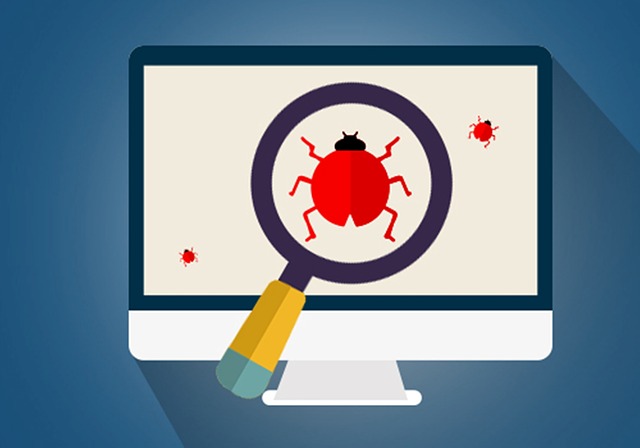What is Avp Antivirus Malware? What does Avp Antivirus Malware do? Is Avp Antivirus Malware safe? Can you trust Avp Antivirus Malware? Is Avp Antivirus Malware a virus?
The Avp Antivirus Malware is a dangerous weapon used against computer users worldwide. It infects mainly via phishing email messages. Our article gives an overview of its behavior according to the collected samples and available reports, also it may be helpful in attempting to remove the virus.

Threat Summary
| Name | Avp Antivirus malware |
| Type | Trojan |
| Short Description | The Avp Antivirus Malware Malware is a scam program that is designed to infiltrate computer systems. |
| Symptoms | The victims may not experience any apparent symptoms of infection. |
| Distribution Method | Phishing Messages, Freeware Installations, Bundled Packages, Scripts and others. |
| Detection Tool |
See If Your System Has Been Affected by malware
Download
Malware Removal Tool
|
| User Experience | Join Our Forum to Discuss Avp Antivirus malware. |

Avp Antivirus Malware Malware – Distribution Methods
The AVP Antivirus malware is a scam program which is created by an unknown developer or criminal collective and seeks to manipulate computer users into believing that they are installing a legitimate software. Various techniques can be used in order to spread the samples as effectively as possible. Commonly this includes the use of phishing tactics that will impersonate the design and layout of legitimate notifications that are sent by well-known companies and services. The idea is to trick the recipients of the emails into seeing that the presented AVP Antivirus malware is safe. Some of the example messages that the users can receive are the following:
- Special Offers — The malware will be advertised as a special product and the users will be offered a lucrative deal if they agree to download and install it.
- Bundle Installation — The AVP Antivirus malware can be installed alongside other software that is advertised in other program descriptions or faux app installers.
- Update Notifications — The victims will receive email notifications stating that they need to update their systems by installing the associated AVP Antivirus malware.
Additionally to make the recipients believe that they are truly installing a safe program is to create numerous fake sites. The tactic here is to host them on similar sounding domain names to download portals, company home pages and other related sites. Additionally the hackers can implement various security certificates, familiar branding and layouts.
What’s more dangerous is when the criminals use various covert tactics that will install the applications without the victims are made aware. This includes the insertion of the virus installation in various payload carriers. An example file can be a document of every popular format: text file, presentations, databases and spreadsheets. They contain macros that will lead to the virus deployment. This is usually done by presenting a prompt to the victims that will request them into enabling the contents. The quoted reason is that this is required in order to correctly view the documents.
The other popular mechanism is to embed the virus installation instructions in software installers which are often run by the target users. The hackers do this by taking the original setup files from their official sources and modifying them to include the AVP Antivirus malware. The infected programs can be of all popular types: system utilities, productivity and office programs, creativity suites and even computer games. To aid the distribution of the malware further the hackers can even include the relevant code into browser hijackers which are dangerous plugins made compatible with the most popular web browsers. they are usually hosted at the relevant repositories using fake developer credentials or user reviews. The posted descriptions can also include videos and promises of adding in new features or performance enhancement.
To further aid the distribution of the malware files they can be uploaded to various file-sharing networks like BitTorrent where popular legitimate and even pirate data can be found.

Avp Antivirus Malware Malware – Detailed Description
As soon as the AVP Antivirus malware is installed on a given computer it can execute a wide variety of different actions. In most cases the application window will emulate the looks and feel of well-known security software. At the same time the offered functionality may be limited in a “trial mode” wherein actual system manipulation will take place only when the user has paid the app developers. This is done in order to scam the victims for paying for a program that, in the end, not function as advertised.
WARNING! This article is created for the malware version as detected and reported to us. There may be a legitimate application using the same name which may be a safe and good utility.
Depending on the acquired version different malware actions can take place including the following:
- Data Theft — The information gathering mdule can be used to harvest personal information about the victims and also their machines. The collected data can be used for identity crimes and the generation of an unique ID that can be associated with every compromised machine.
- System Changes — The AVP Antivirus malware can be installed as a persistent threat which means that it will be started every time the computer boots. This step can also be used to disable access to the recovery boot options thereby making a lot of the manual user recovery guides unusable.
- Security Applications Bypass — The hackers can include a special code that will analyze the system for any installed security services. They will be bypassed or entirely blocked. The list of affected programs includees the following: anti-virus programs, firewalls, intrusion detection systems, virtual machine hosts and etc.
- Windows Registry Changes — The AVP Antivirus malware can also be used to edit or create new values in the Windows Registry. This will lead to many dangerous consequences including serious performance issues, problems when using certain features or application and even data loss.
- Malware Delivery — The active infections can be used to deploy other malware to the hosts. This is done in purpose and is popularly used to install Trojans, miners and ransomware.
- Data Removal — The main engine can scan for files that are deemed as sensitive or important to the system or the users. They will be removed from the computer and can include the likes of backups, shadow volume copies and recovery points.
Because very infection can exhibit different consequences, including others that are not mentioned aboe we recommend that every afected user scan their systems with a professional anti-spyware utility to guarantee that they are affected by the scam program.

Remove Avp Antivirus Malware Malware
If you want to remove the Avp Antivirus Malware Malware unwanted software from your computer we recommend that you use a specific anti-malware software. With a such an anti-malware program, your computer will remain with a better protection and stay healthy performance-wise in the future.
Preparation before removing Avp Antivirus malware.
Before starting the actual removal process, we recommend that you do the following preparation steps.
- Make sure you have these instructions always open and in front of your eyes.
- Do a backup of all of your files, even if they could be damaged. You should back up your data with a cloud backup solution and insure your files against any type of loss, even from the most severe threats.
- Be patient as this could take a while.
- Scan for Malware
- Fix Registries
- Remove Virus Files
Step 1: Scan for Avp Antivirus malware with SpyHunter Anti-Malware Tool
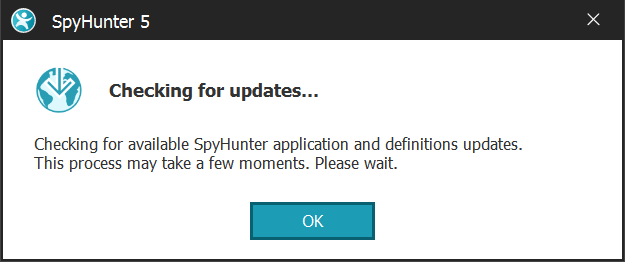
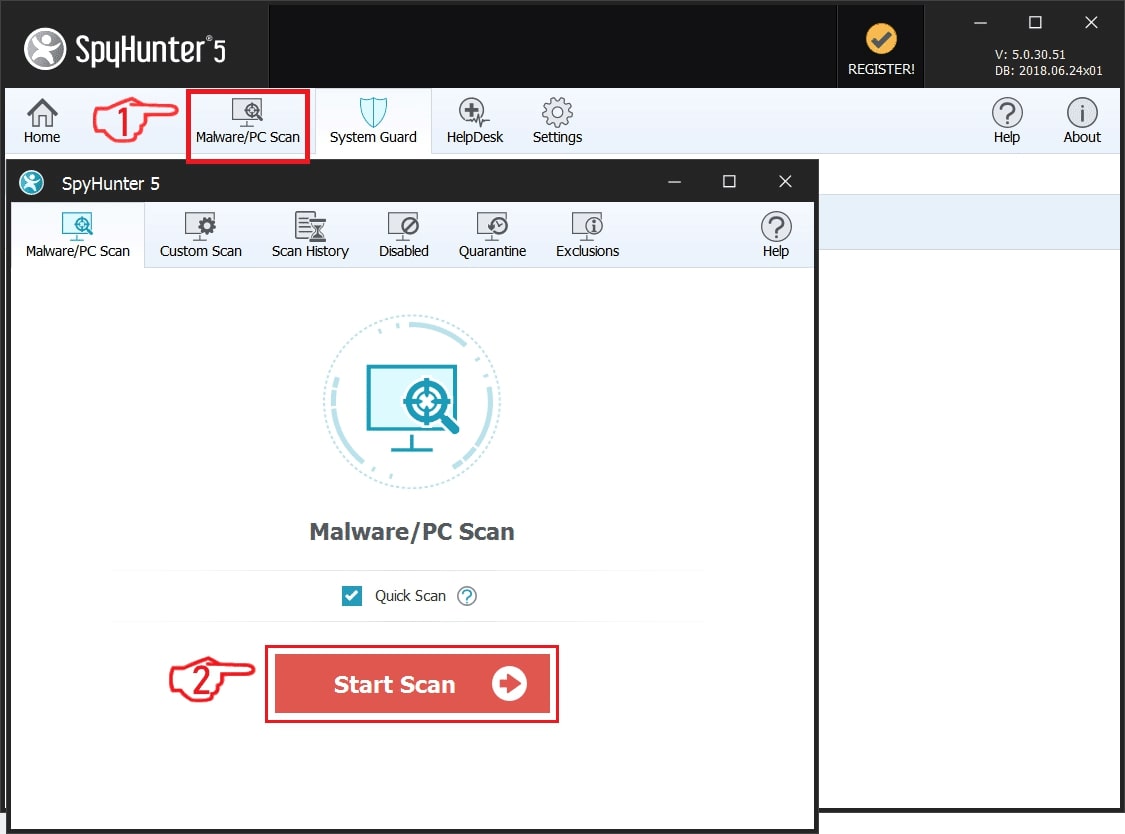
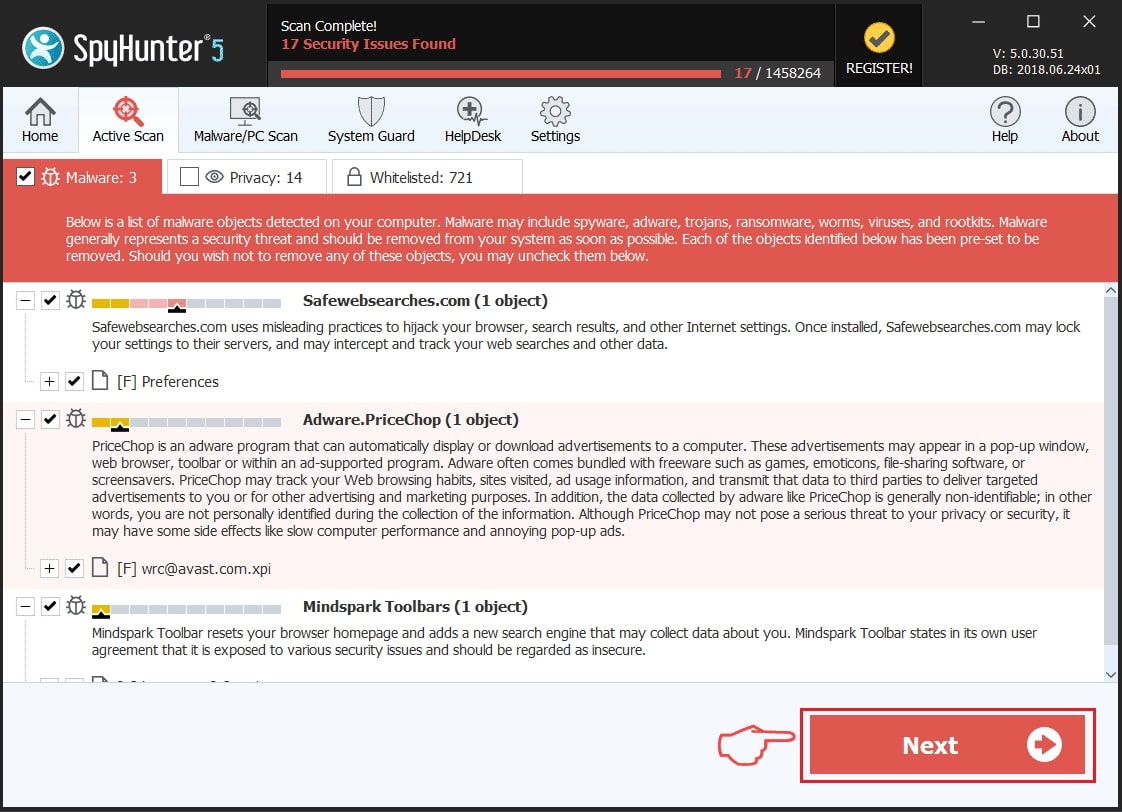
Step 2: Clean any registries, created by Avp Antivirus malware on your computer.
The usually targeted registries of Windows machines are the following:
- HKEY_LOCAL_MACHINE\Software\Microsoft\Windows\CurrentVersion\Run
- HKEY_CURRENT_USER\Software\Microsoft\Windows\CurrentVersion\Run
- HKEY_LOCAL_MACHINE\Software\Microsoft\Windows\CurrentVersion\RunOnce
- HKEY_CURRENT_USER\Software\Microsoft\Windows\CurrentVersion\RunOnce
You can access them by opening the Windows registry editor and deleting any values, created by Avp Antivirus malware there. This can happen by following the steps underneath:
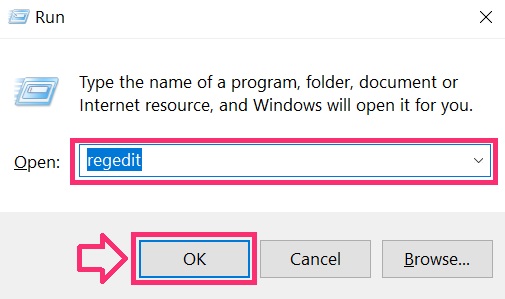

 Tip: To find a virus-created value, you can right-click on it and click "Modify" to see which file it is set to run. If this is the virus file location, remove the value.
Tip: To find a virus-created value, you can right-click on it and click "Modify" to see which file it is set to run. If this is the virus file location, remove the value.Step 3: Find virus files created by Avp Antivirus malware on your PC.
1.For Windows 8, 8.1 and 10.
For Newer Windows Operating Systems
1: On your keyboard press + R and write explorer.exe in the Run text box and then click on the Ok button.
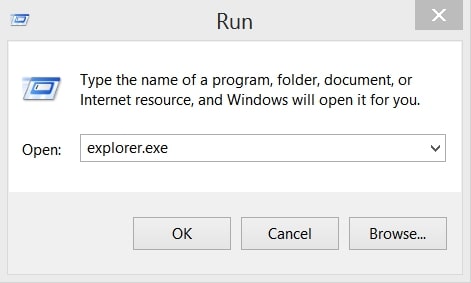
2: Click on your PC from the quick access bar. This is usually an icon with a monitor and its name is either “My Computer”, “My PC” or “This PC” or whatever you have named it.
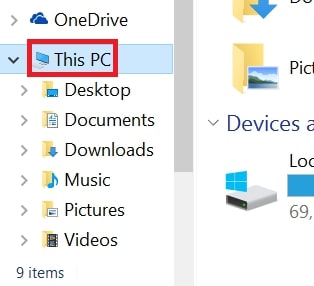
3: Navigate to the search box in the top-right of your PC's screen and type “fileextension:” and after which type the file extension. If you are looking for malicious executables, an example may be "fileextension:exe". After doing that, leave a space and type the file name you believe the malware has created. Here is how it may appear if your file has been found:
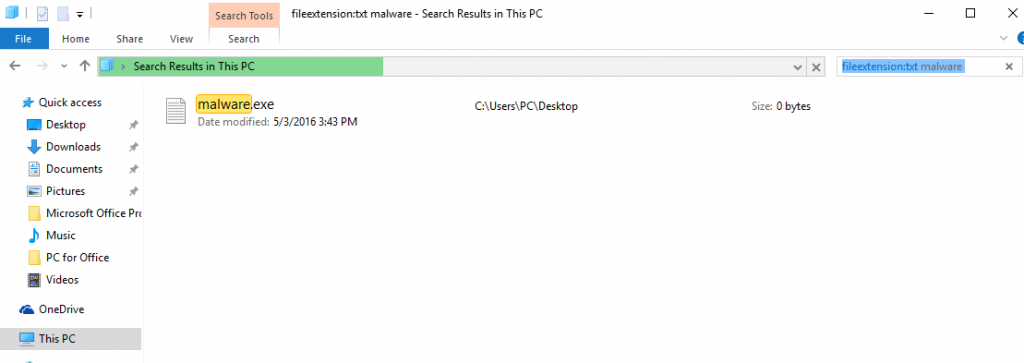
N.B. We recommend to wait for the green loading bar in the navigation box to fill up in case the PC is looking for the file and hasn't found it yet.
2.For Windows XP, Vista, and 7.
For Older Windows Operating Systems
In older Windows OS's the conventional approach should be the effective one:
1: Click on the Start Menu icon (usually on your bottom-left) and then choose the Search preference.
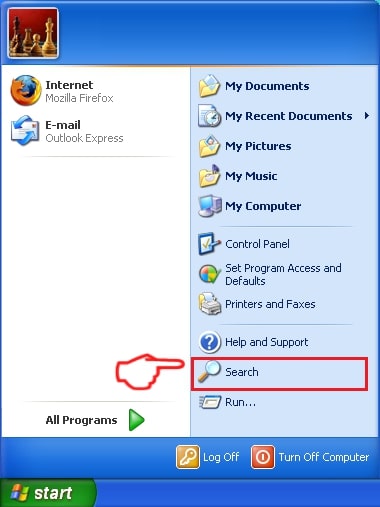
2: After the search window appears, choose More Advanced Options from the search assistant box. Another way is by clicking on All Files and Folders.
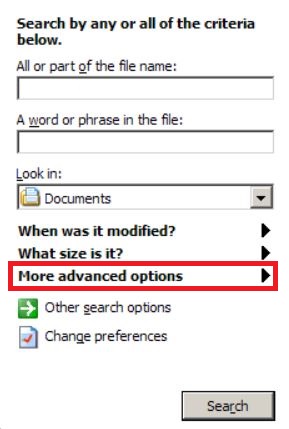
3: After that type the name of the file you are looking for and click on the Search button. This might take some time after which results will appear. If you have found the malicious file, you may copy or open its location by right-clicking on it.
Now you should be able to discover any file on Windows as long as it is on your hard drive and is not concealed via special software.
Avp Antivirus malware FAQ
What Does Avp Antivirus malware Trojan Do?
The Avp Antivirus malware Trojan is a malicious computer program designed to disrupt, damage, or gain unauthorized access to a computer system. It can be used to steal sensitive data, gain control over a system, or launch other malicious activities.
Can Trojans Steal Passwords?
Yes, Trojans, like Avp Antivirus malware, can steal passwords. These malicious programs are designed to gain access to a user's computer, spy on victims and steal sensitive information such as banking details and passwords.
Can Avp Antivirus malware Trojan Hide Itself?
Yes, it can. A Trojan can use various techniques to mask itself, including rootkits, encryption, and obfuscation, to hide from security scanners and evade detection.
Can a Trojan be Removed by Factory Reset?
Yes, a Trojan can be removed by factory resetting your device. This is because it will restore the device to its original state, eliminating any malicious software that may have been installed. Bear in mind that there are more sophisticated Trojans that leave backdoors and reinfect even after a factory reset.
Can Avp Antivirus malware Trojan Infect WiFi?
Yes, it is possible for a Trojan to infect WiFi networks. When a user connects to the infected network, the Trojan can spread to other connected devices and can access sensitive information on the network.
Can Trojans Be Deleted?
Yes, Trojans can be deleted. This is typically done by running a powerful anti-virus or anti-malware program that is designed to detect and remove malicious files. In some cases, manual deletion of the Trojan may also be necessary.
Can Trojans Steal Files?
Yes, Trojans can steal files if they are installed on a computer. This is done by allowing the malware author or user to gain access to the computer and then steal the files stored on it.
Which Anti-Malware Can Remove Trojans?
Anti-malware programs such as SpyHunter are capable of scanning for and removing Trojans from your computer. It is important to keep your anti-malware up to date and regularly scan your system for any malicious software.
Can Trojans Infect USB?
Yes, Trojans can infect USB devices. USB Trojans typically spread through malicious files downloaded from the internet or shared via email, allowing the hacker to gain access to a user's confidential data.
About the Avp Antivirus malware Research
The content we publish on SensorsTechForum.com, this Avp Antivirus malware how-to removal guide included, is the outcome of extensive research, hard work and our team’s devotion to help you remove the specific trojan problem.
How did we conduct the research on Avp Antivirus malware?
Please note that our research is based on an independent investigation. We are in contact with independent security researchers, thanks to which we receive daily updates on the latest malware definitions, including the various types of trojans (backdoor, downloader, infostealer, ransom, etc.)
Furthermore, the research behind the Avp Antivirus malware threat is backed with VirusTotal.
To better understand the threat posed by trojans, please refer to the following articles which provide knowledgeable details.


